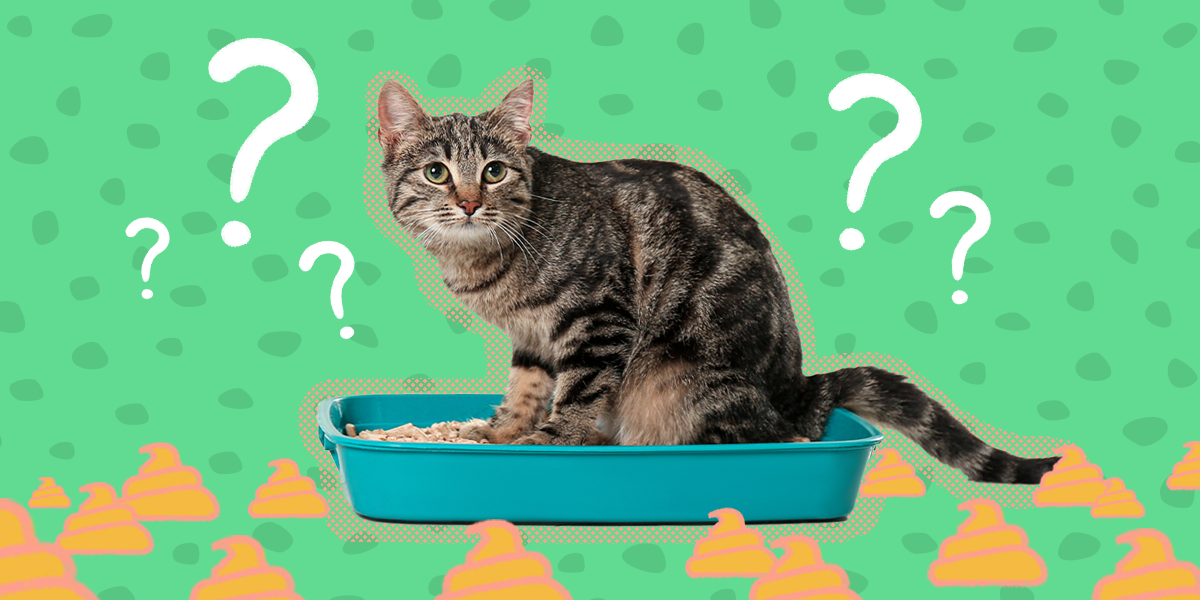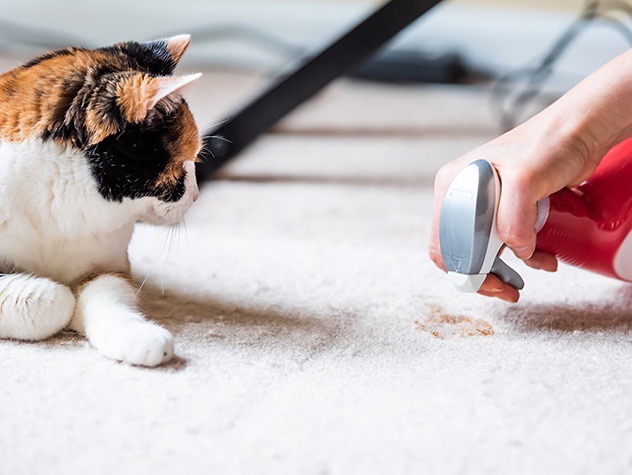“No, no, NO! Not again!” You scream, staring in disbelief at the fresh pile of cat poop beside the litter box. Your beloved feline companion, the furry king (or queen) of your heart, has once again decided to leave their calling card in the most inconvenient place imaginable. The question is, why? Why would your cat, the creature who meticulously grooms themselves for hours, choose to defecate on the floor instead of their pristine litter box? The answer, unsurprisingly, is more complex than you might think.

Image: www.thedodo.com
Today, we’ll delve into the curious reasons behind this common cat behavior. We’ll explore the most likely culprits, including medical issues, anxiety, litter box preferences, and even territorial disputes. Fear not, though, because along the way, we’ll equip you with actionable tips to retrain your cat and reclaim your sanity. By understanding the root causes and implementing the right strategies, you can reclaim your home’s pristine floors and restore harmony with your furry friend.
Unveiling the Mystery: Possible Reasons for Litter Box Misses
The first step in addressing this frustrating feline behavior is to understand the underlying causes. While some cats might seem to be rebelling just for the sake of it, there are often deeper reasons behind their sudden aversion to the litter box.
Medical Marvels: Ruling Out Underlying Health Conditions
First and foremost, it’s crucial to rule out any potential medical issues. A change in litter box behavior could be an early sign of a health problem.
- Urinary Tract Infections (UTIs): A UTI can make urination painful, leading to your cat seeking out alternative, less painful spots to relieve themselves, like the floor.
- Constipation: Difficulty passing stool can cause your cat to avoid the litter box due to discomfort or inability to eliminate properly.
- Gastrointestinal Issues: If your cat is experiencing diarrhea or other gastrointestinal problems, they may not be able to reach the litter box in time, resulting in accidents.
- Arthritis: Older cats with joint pain might struggle to reach the litter box, even if it’s in a convenient location.
If you suspect your cat is struggling with a health issue, it’s crucial to schedule a visit with your veterinarian. They can diagnose any underlying medical conditions and recommend appropriate treatment.
The Litter Box Lowdown: Preferences and Problems
Next, let’s consider the litter box itself. Cats are notoriously picky about their bathroom accommodations, and a seemingly minor change can send their preferences spiraling.
- Litter Type: The texture, scent, and even color of the litter can influence your cat’s opinion of the box. A new litter introduced too quickly could trigger a boycott of the litter box.
- Litter Box Placement: Cats prefer their litter box to be in a quiet, private location away from high traffic areas and noisy appliances. Ensure it’s accessible without any obstructions.
- Litter Box Maintenance: A dirty litter box is a surefire way to get your cat to look for alternatives. Ideally, you should scoop the box daily and completely change the litter every week to keep it smelling fresh and inviting.
- Number of Litter Boxes: Multiple cats in the house will require multiple litter boxes. As a general rule, aim for one litter box per cat, plus one extra.

Image: www.petfinder.com
Feline Emotions: Anxiety, Stress, and Territorial Disputes
Beyond physical reasons, your cat’s behavior could be influenced by emotions. Stress, anxiety, and even territorial disputes can significantly impact their bathroom habits.
- Stressful Changes: Any changes in your cat’s surroundings or routine can trigger stress, including moving to a new home, welcoming a new pet, or even rearranging furniture.
- Fear and Anxiety: Loud noises, strange visitors, or even a new laundry detergent can be enough to stress your cat and lead to accidents.
- Territorial Disputes: If you have multiple cats, they may fight over resources, including litter boxes. They might urinate or defecate outside the box to mark their territory.
Decoding the Signals: Understanding Your Cat’s Behavior
Pay close attention to your cat’s body language and see if there are any other patterns associated with the litter box misses.
- Increased Urination: More frequent urination could indicate a UTI or stress-induced behavior, like marking territory.
- Straining or Difficulty Urinating: This could suggest pain or discomfort associated with UTIs, constipation, or other medical conditions.
- Hiding or Avoiding the Litter Box: Your cat may become fearful of the litter box due to unpleasant experiences or association with negative emotions.
Restoring Harmony: Solutions to Address Litter Box Miss
Once you’ve identified the likely cause, you can address the issue and restore harmony in your home.
Address Medical Needs: Consult Your Vet
As previously mentioned, a veterinarian visit is crucial to rule out any underlying medical conditions. Once diagnosed, your vet can help create a treatment plan to address the issue and restore your cat’s health.
Re-evaluate the Litter Box
- Litter Type: If you’ve recently changed litter, try returning to the previous type. If you’re using a scented litter, switch to an unscented option.
- Location: Make sure the litter box is placed in a quiet area, away from loud noises and high traffic areas.
- Cleaning Routine: Emphasize regular cleaning practices. Scoop the box daily and completely change the litter at least once a week.
Address Anxiety and Stress
- Provide Security and Comfort: Create a safe space for your cat where they can retreat and feel secure, such as a cat tree or covered bed.
- Reduce Stressors: Identify any potential sources of stress and work to minimize their impact. This may involve addressing noisy appliances, providing a quiet space for your cat, or using calming pheromone diffusers.
- Behavioral Therapy: If your cat’s anxiety or fear is severe, consider working with a certified veterinary behaviorist to develop an appropriate behavior modification plan.
Manage Territorial Disputes
- Increased Resources: Provide additional litter boxes, food bowls, and scratching posts to reduce competition.
- Feliway Pheromone Diffusers: These diffusers emit calming pheromones that can help reduce stress and anxiety, leading to better cooperation between cats.
Patience and Persistence: A Long-Term Solution
It’s important to remember that retraining your cat might take time and patience. Avoid punishing your cat for accidents. This will only increase their anxiety and may cause them to avoid the litter box even more. Instead, focus on positive reinforcement. Praise and reward your cat with treats or gentle petting whenever they use the litter box appropriately.
Seek Professional Advice: When to Call in the Experts
If all else fails and your cat continues to use the floor instead of the litter box, don’t hesitate to reach out to a veterinary behaviorist. They can evaluate the situation, identify potential contributing factors, and create a customized plan to address your cat’s behavioral issues.
Cat Poops On Floor Beside Litter Box
Conclusion: Understanding Your Cat’s Pooping Habits
While the sight of your cat using the floor as a restroom might be frustrating, it’s important to approach the situation with understanding and empathy. By dissecting the possible causes, from medical issues to emotional stress, you can implement the right solutions to help your cat overcome this challenging behavior. Remember, with patience, dedication, and a little understanding, you can bring harmony back to your home and keep your floors poop-free. But most importantly, maintain a loving and supportive home for your furry friend, who, despite their occasional bathroom faux pas, still holds a special place in your heart.

:max_bytes(150000):strip_icc()/OrangeGloEverydayHardwoodFloorCleaner22oz-5a95a4dd04d1cf0037cbd59c.jpeg?w=740&resize=740,414&ssl=1)




